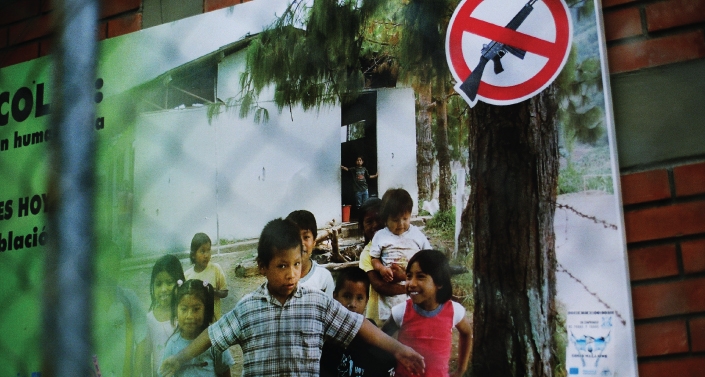Attacks on schools commonplace in conflicts around the world
The UN Secretary-General’s report released last week confirms findings that attacks on education are a deliberate tactic in most armed conflicts worldwide, said the Global Coalition to Protect Education from Attack (GCPEA).
Suggested Reading |
Conflict Background |
GCCT |
The UN Secretary-General’s report released last week confirms findings that attacks on education are a deliberate tactic in most armed conflicts worldwide, said the Global Coalition to Protect Education from Attack (GCPEA).
The annual report of the Secretary-General to the UN Security Council on children and armed conflict provides an overview of six ‘grave violations’ committed against children, the measures taken to protect them, and recommendations for further action. According to the Secretary-General, attacks on schools are a common feature in the majority of the situations documented in the report: 17 of the 23 conflicts profiled include targeted attacks on schools, students, and/or teachers.
The report highlights the violations perpetrated by Boko Haram in Nigeria, where targeted attacks on education intensified in 2013, killing and maiming hundreds of students and teachers. In Borno—the northeastern state where nearly 300 schoolgirls were abducted in April 2014—recurrent attacks on schools severely disrupted the right to education for approximately 15,000 children.
In addition to Nigeria, the report covers other conflict situations that feature attacks on schools: Afghanistan, Central African Republic (CAR), Colombia, Democratic Republic of Congo (DRC), India, Iraq, Israel and State of Palestine, Libya, Pakistan, Philippines, Somalia, South Sudan, Sudan, Syria, Thailand, and Yemen.
“The Secretary-General’s report shows that schools are being deliberately bombed, burned, and used by militaries during war, to achieve political and strategic objectives,” said GCPEA Director Diya Nijhowne. “In addition to the risk of death, severe injury, and long-lasting psychological distress, attacks can keep children out of school, sometimes permanently, blocking their hopes and dreams for the future.”
The report also lists armed forces and groups committing the violations. Once listed, the Security Council can act against these parties by imposing targeted sanctions. Last year’s report was the first to include attacks on schools and school personnel as trigger offenses for listing. Of the 59 parties on this year’s list, eight were named for attacking schools and/or hospitals: Taliban forces in Afghanistan; the ex-Séléka coalition and associated armed groups in CAR; Allied Democratic Forces, Forces démocratiques de libération du Rwanda, and Front de résistance patriotique en Ituri in DRC; Islamic State of Iraq/Al-Qaeda in Iraq; government forces in Syria, including the National Defence Forces and the Shabbiha militia; and Boko Haram in Nigeria.
The troubling use of schools by armed parties as bases, barracks, weapons caches, detention centers and for other military purposes also continued in 2013. According to the Secretary-General, military use of schools was observed in 15 of the 23 situations of concern, depriving children of access to education and putting them and their teachers at risk of attack.
“I note with deep concern continued attacks on and use of schools and their impact on children” said the Secretary-General. “In line with applicable international humanitarian law, and in accordance with Security Council Resolution 2143, I encourage Member States to consider adopting additional concrete measures to deter the military use of schools as a priority.”
GCPEA has led an extensive consultative process to develop the Draft Lucens Guidelines for Protecting Schools and Universities from Military Use during Armed Conflict, with clear recommendations to states and non-state armed groups for minimizing military use of education institutions. Recently the Norwegian government announced its commitment to lead the process of finalizing the Guidelines and urging states to endorse them. Echoing GCPEA’s recommendations, the Secretary-General called for protection of schools to be integrated into military planning and operating procedures.
“Militaries and armed groups must face consequences when they attack schools and universities, their students, and their staff,” said Nijhowne. “This report is a critical step toward ensuring perpetrators are held accountable for these atrocities.”
Watch Special Representative Leila Zerrougui’s presentation of the Annual Report of the Secretary-General on children and armed conflict.
The Global Coalition to Protect Education from Attack (GCPEA) is a unique coalition of international organizations including CARA (Council for Assisting Refugee Academics), Human Rights Watch, the Institute of International Education’s Scholar Rescue Fund, Protect Education in Insecurity and Conflict, Save the Children International, the Scholars at Risk Network, UNHCR, and UNICEF.
TransConflict is an affiliated organization of the Global Coalition to Protect Education from Attack.




















Attacks on schools commonplace in conflicts around the world http://t.co/XwPbiEZMGt via @TransConflict #Education #Report #UN
RT @theobhe: Attacks on schools commonplace in conflicts around the world http://t.co/XwPbiEZMGt via @TransConflict #Education #Report #UN
RT @TransConflict: Attacks on #schools commonplace in #conflicts around the world: The #UN Secretary-General’s report released… http://t.…
RT @theobhe: Attacks on schools commonplace in conflicts around the world http://t.co/XwPbiEZMGt via @TransConflict #Education #Report #UN
RT @TransConflict: Attacks on #schools commonplace in #conflicts around the world: The #UN Secretary-General’s report released… http://t.…
“Attacks on education are a deliberate tactic in most armed conflicts worldwide” – http://t.co/AEt02b2u4F
RT @theobhe: Attacks on schools commonplace in conflicts around the world http://t.co/XwPbiEZMGt via @TransConflict #Education #Report #UN
RT @TransConflict: “Attacks on education are a deliberate tactic in most armed conflicts worldwide” – http://t.co/AEt02b2u4F